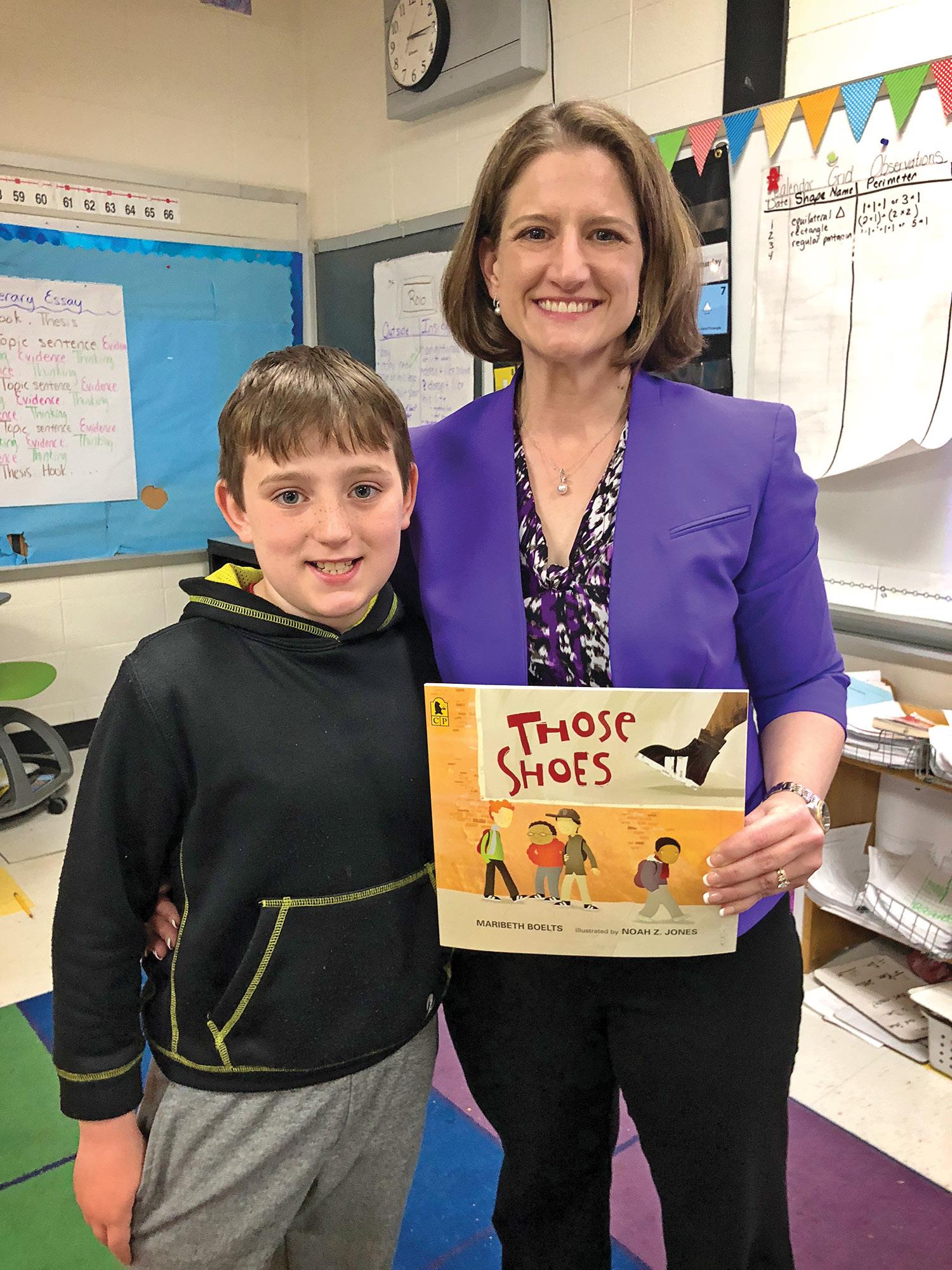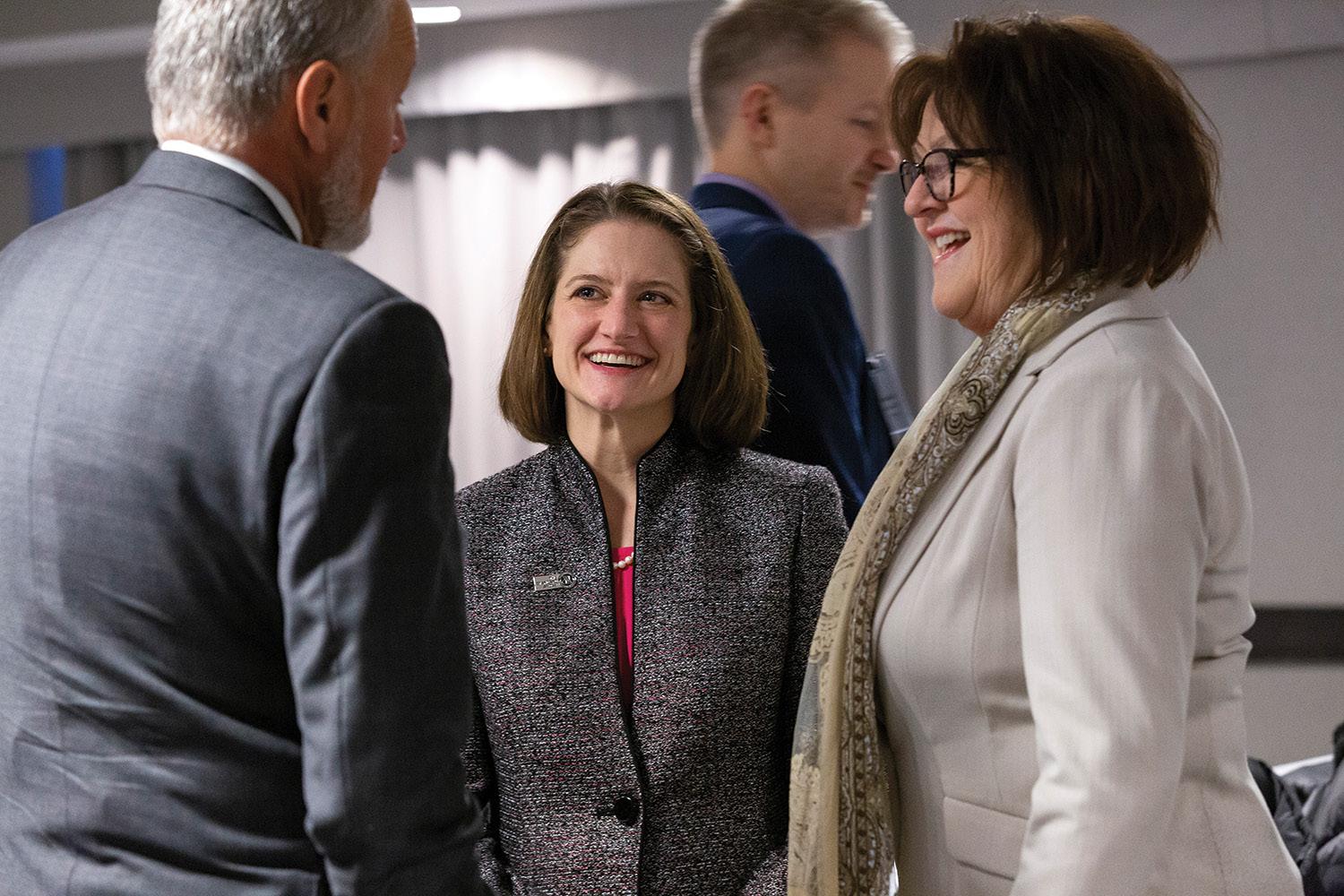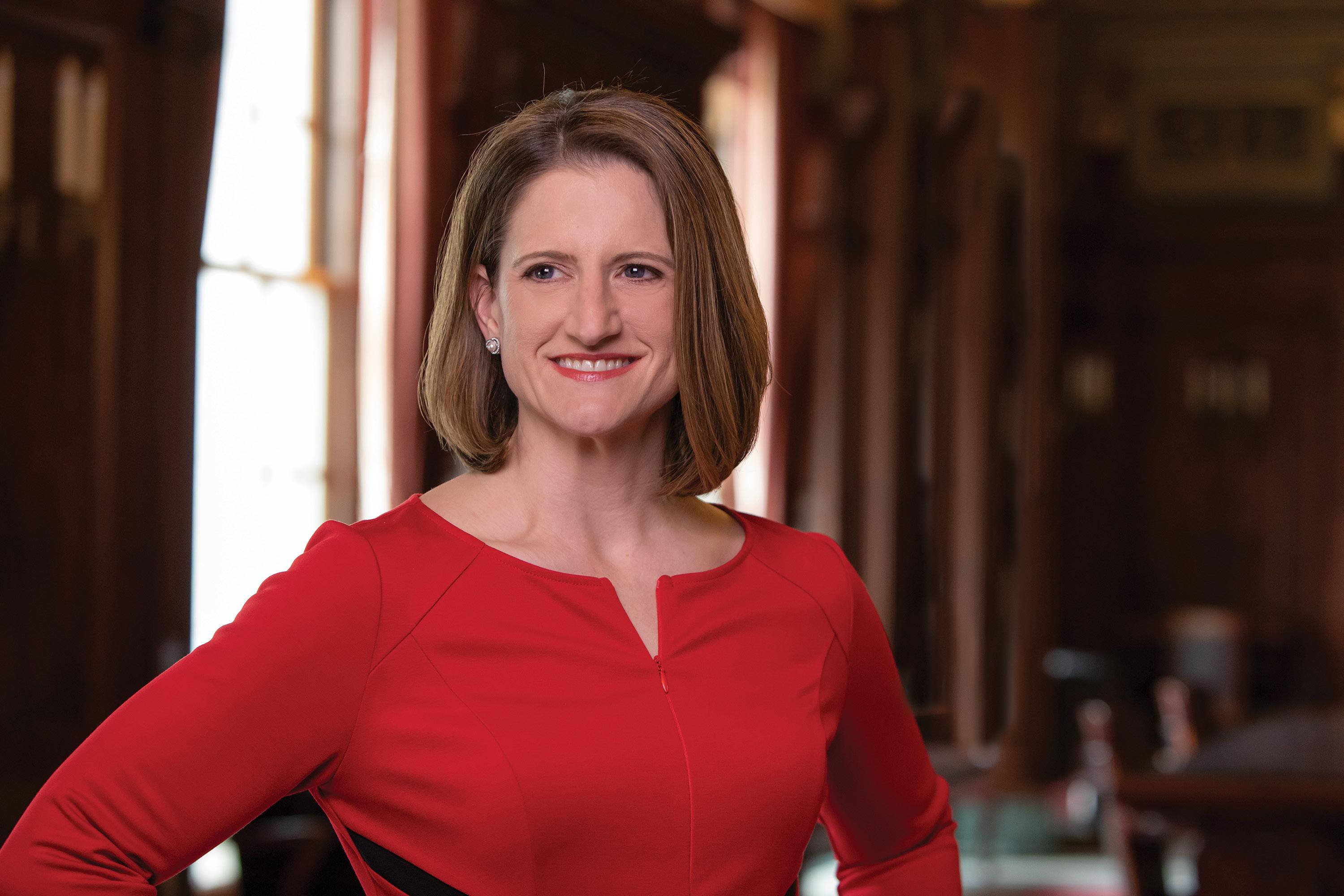
19 minute read
Hill seeker
By Marcia Tillett-Zinzow
There’s no hill too steep for Angela C. Thomas, CPA. She never backs down or does anything halfway — or the usual way, for that matter. How many CPAs do you know who are triathletes, serve in the U.S. Air Force Auxiliary — Civil Air Patrol, own two Cornish Rex cats and have met nearly all the actors who have played Doctor Who in the British sci-fi TV show of the same name? None? Well, that’s about to change. Thomas, who took the reins as chair of the WICPA board in May, is currently the expenditure and revenue accounting section chief for the Wisconsin Department of Natural Resources (DNR). But she came to accounting through nontraditional means. Growing up in West Allis, Thomas graduated from Nathan Hale High School before attending the University of Wisconsin and obtaining a Bachelor of Science degree in biology in 2005. She wanted to be a pharmacist. In fact, she was certified as a pharmacy technician while still in high school, encouraged by her manager at Walgreens to do so. One of the things certification qualified her to do was to use rates and ratios to determine how a given medication should be compounded to achieve the correct dosage. “I loved it,” she said. “It was all about numbers, and while I didn’t know it at the time, I am a numbers person!” Thomas remained with Walgreens as a pharmacy tech until she graduated from college. With her biology degree in hand, she went to work for the University of Wisconsin Hospitals and Clinics as a pharmacy assistant. After two years, she began to take her love of numbers more seriously. Continuing to work full time for the hospital system, she went back to school in 2007, this time at Lakeland University. “They had a blended learning program for returning adults. I could go to class on-site at the Madison campus, or I could do my work online. As somebody who had a family and a full-time job and volunteered in other things, I thought it might work for me,” Thomas said. She started with one accounting class — and then another … and another, finally deciding she was “all in” to not only get her degree in accounting but to do what it took to become a CPA. In 2011, she graduated with a Bachelor of Arts in accounting and took her first accounting job as a budget analyst for the hospital system. Next, she went to the Wisconsin Department of Justice as an accountant and eventually took her skills at finding efficiencies and streamlining processes to the DNR. She is one of only 2% of WICPA members who work in government. “There are so many opportunities in government. I want to know that our collected revenue and taxes are being spent effectively and efficiently. Like any other business, the government needs good accountants, and I think I can contribute,” she said. Thomas’s work accomplishments and volunteering earned her the honor in 2018 of being named to In Business magazine’s “40 Under 40” list of up-and-coming Madisonarea young professionals. “It’s the thing I’m most proud of,” she said.
An early start on leadership
Thomas began her journey to leadership with the Civil Air Patrol (CAP), which she’s been a member of since age 13. CAP has three missions: carrying out emergency services and disaster relief missions nationwide, aerospace education and a youth development “cadet” program. She discovered CAP while attending an air show at General Mitchell Field in Milwaukee with her grandfather, who had served in the U.S. Air Force in World War II. “There was a CAP information booth there, and there were kids just like me dressed in uniform, telling folks about

the program,” she said. “It sounded very interesting, so I started going to meetings at Timmerman Field and joined the 623rd Composite Squadron.” She’s been with CAP for 26 years now, starting at the level of cadet and eventually working her way up to the rank of lieutenant colonel, the highest rank one can achieve without serving as commander of Wisconsin Wing, an appointed position. Each level along the way required leadership, aerospace knowledge, physical fitness testing, squadron activity and moral leadership/ethics. As a cadet, Thomas learned to be a team member, to show respect to others, how to wear the Air Force-style uniform and how to drill. She also studied aircraft and spacecraft and attended regional and national CAP events, including the Wisconsin Cadet Academy, during which she earned the distinction of Honor Cadet in 1996. “I was awarded a Saber, which I still have today, in recognition of that honor,” she said. The same year, she was also selected Wisconsin Cadet of the Year and received a personal note of congratulations from then U.S. Rep. Gerald Kleczka, who was a congressional CAP member at the time. Other awards she earned include the Meritorious Service Award in 1999, 2007 and 2010; the Commander’s Commendation Award, which she received 10 times between 1995 and 2016; and Cadet Program Officer of the Year in 2007. Thomas continues volunteering with CAP as a senior member, primarily assisting young cadets as they learn the ropes of military protocol, public service and volunteering. One of her favorite tasks was volunteering at the Madison unit as the deputy commander for cadets. In that post, she educated, motivated and taught young cadets how to be of service to their communities, state and nation. “I met with approximately 25 cadets weekly, guiding them as they completed the cadet program. Helping cadets learn and grow, being a mentor to them so they could be successful — just as I was when I was a cadet — was rewarding and challenging to me,” Thomas said. Recently, she served a four-year term as the Southwest Group commander, with five squadron commanders reporting directly to her and about 115 senior members and cadets within the five units. Her role was to provide direction and motivation and to ensure compliance with regulations. Thomas has also participated on several occasions with CAP Legislative Day, which she said is very similar to WICPA Advocacy Day. Her CAP experiences, combined with her involvement with the Public Policy Committee and her role with state government, will serve her well this year as the WICPA board chair.
Inspiration and perseverance
Thomas’s latest challenge has been training for and participating in triathlons, including the rigorous Ironman Triathlon, which consists of a 2.4-mile swim, a 112-mile bicycle ride and a marathon 26.2-mile run, raced in that order. “It’s probably the greatest challenge I’ve faced,” she said. “The secret is to set your expectations for yourself. Triathlon is really a race with yourself, a progression in your own journey. That’s what I love about it. I’m participating with a lot of other people out there, but it’s just for me — comparing the me of yesterday with the me of today.” Thomas became interested in triathlon after watching her cousin — a busy working mother of two whom she greatly admired — complete her first Ironman.

Thomas has been an active participant in the WICPA's annual Advocacy Day.
She has also been active with Reading Makes Cents and is seen here with son Xander.

“I was seriously out there watching her from sunup to sundown,” Thomas said. “It’s a very long day for triathletes and spectators, but I was energized the entire time. Just watching her go after her goal, smiling and loving it all — I just felt carried along in that journey.” After that, Thomas set her own goals and began getting herself in shape to train for her first triathlon. The first step was to lose some weight by participating in Weight Watchers and beginning a program of physical exercise, which started with just 10-minute increments a couple times a week. “I went outside and said, ‘OK, I’m just going to jog from this point to the end of that road and come back home. It took all of 10 minutes, but it was painful!” she said. She gradually worked up to running longer distances, and in 2014, she added biking and swimming when she joined a beginner triathlete program. In that program, she completed her first sprint triathlon. “Prior to completing that triathlon, I could barely swim 25 yards, let alone swim in lake water. I have diligently worked to learn to swim and improve the duration I can swim while also overcoming my fear in the water,” Thomas said. In October 2018, Thomas completed her first full Ironman in Louisville, Kentucky, and in September 2019, she completed the Ironman in Madison. “I had planned to participate in an Ironman that was to take place last summer in Santa Rosa, California, with my cousin from Salt Lake City,” she explained. “Our families were coming and everything — but the pandemic changed all that.” She hopes to participate in a Madison Ironman that’s been scheduled for this September. She said she has learned lessons in leadership and perseverance through her Ironman experience. “I practiced keeping my head in the moment and dealing with the challenges that result from the unexpected. I learned I can always give a little more, push on — and that sometimes I need to slow down in order to go faster for the long haul,” she said.

In 2018, Thomas completed her first Ironman Triathlon.
Thomas said a quote about “Hill Seekers” stuck with her throughout her triathlon journey and helped her to keep perspective and work through hard things. It could also apply to everything she’s done in life, from her achievements in CAP to going back to college for a second degree and becoming a CPA to succeeding as a triathlete: Most of us try to avoid hills, but what’s so good about that? Think about flat tires, flat hair, flat returns and the ultimate flatlining. Life happens on the hills. They’re opportunities to prove to yourself that you’re stronger than you ever imagined. If you never attempt the ascent, you’ll never know the thrill of swooshing down the other side. – Author unknown
Marcia Tillett-Zinzow is a Wisconsin freelance writer and editor. Contact her at mtzinzow@icloud.com.

Jeff, Angela and Xander Thomas.
Family vacations — and Doctor Who
Thomas and her husband, Jeff, celebrated 20 years of marriage last year. They love to travel, and they’ve done some interesting things and had some surprises along the way. A trip they had planned to Prague in 2005 had to be scrapped at the last minute due to a bomb threat at London’s Heathrow Airport. They had saved a long time for the trip, and it was quite disappointing. “They were letting people fly into Heathrow, but they weren’t letting anyone fly out because they were investigating this bomb threat,” Thomas said. “We were going to be there for only a few days before jetting off to Prague, but we ended up cancelling.” Their disappointment didn’t last long, however, as they quickly pivoted and decided to use their vacation time to visit Hawaii instead. The trip was a highlight for them. On a 2019 trip to Paris, Thomas ran her first marathon and toured the city at the same time, taking in the beautiful and historic surroundings as she ran. One of their plans for that trip was foiled, however. “After I ran, we opted for a bus tour past the Notre Dame Cathedral, and we were going to go back the next day to see the inside,” Thomas said. “Unfortunately, while we were having dinner that night, we learned the cathedral was on fire.” The couple, along with their 12-year-old son, Alexander (whom they call “Xander”), have also visited many U.S. cities as well as London, England, to attend Comic Con and Wizard World conventions, where they have met many actors and actresses, including nearly all of the 13 actors who have played Doctor Who over the years. “It just became something that we do together as a family that a lot of people probably don’t know about me. It doesn’t come up in conversation,” she mused. “The show is very sci-fi based. A lot of times I don’t even know how they’re going from A to B because it’s just so far out. But it is truly entertaining, and it takes you away from everything else because you’re so focused on what’s going on.” As a strong female leader in her own right, Thomas was delighted when she discovered the current Doctor Who is a woman — the first to play the role. “She plays it very well,” Thomas said. “Whenever she holds a conference, we hope to meet her, too.”
Introducing your WICPA Board of Directors
The WICPA Board of Directors provides strategic governance in accordance with the WICPA strategic plan, mission and vision. The board ensures the WICPA serves the diverse needs of members, enhances professional competency, promotes the value of members and the profession, advocates on behalf of the profession and builds community among members.

CHAIR
Angela C. Thomas, CPA,
expenditure & revenue accounting section chief, Wisconsin Department of Natural Resources, Madison CHAIR-ELECT
Steven A. Pullara, CPA,
CGMA, tax partner, BDO USA LLP, Madison PAST CHAIR
Wendi M. Unger, CPA,
partner, Baker Tilly, Milwaukee SECRETARY/TREASURER
Lucien A. Beaudry, CPA, JD,
equity shareholder, Reinhart Boerner Van Deuren s.c., Milwaukee

DIRECTOR
Jeff Dewane, CPA, CGMA,
CMA, MBA, assistant controller, Vinton Construction Company, Manitowoc DIRECTOR
John R. Heindel, CPA,
business partner, Lauber Business Partners, Milwaukee DIRECTOR
Ruth A. Kallio-Mielke, CPA,
managing director, Deloitte & Touche LLP, Milwaukee DIRECTOR
Kyle R. Stephens, CPA,
vice president of finance and administration, Good City Brewing LLC, Milwaukee

DIRECTOR
Stacy A. Stinson, CPA,
assistant professor – accounting, Concordia University, Mequon AICPA COUNCIL
Ryan J. Hanson, CPA, CGMA
AICPA COUNCIL
Neil R. Keller, CPA/ABV,
CVA, partner-in-charge, tax services, Sikich LLP, Brookfield
RESCUE ME RESCUE ME

Congress provides additional pandemic relief with the American Rescue Plan Act.
By Jim Brandenburg, CPA, MST
On March 10, Congress passed its latest COVID-19 relief legislation. The $1.9 trillion American Rescue Plan Act of 2021 (ARPA) was signed into law by President Biden on March 11 (sans the $15 minimum wage increase the House approved, which was removed by the Senate). The ARPA is the third major pandemic bill passed within the last 12 months, bringing the total relief to over $5 trillion. This article provides an overview of selected tax and business provisions in the Act.
• Economic Impact Payments (EIP) for 2021: EIP amounts are $1,400 per taxpayer plus $1,400 per dependent child. Qualifying dependents include full-time students under the age of 24 and adult dependents. Taxpayers are eligible if they have an adjusted gross income (AGI) of up to $75,000 for singles and married persons filing separately, up to $112,500 for heads of household, and up to $150,000 for married couples filing jointly and surviving spouses. Filers with incomes above those levels receive a shortened phase-out range.
• Unemployment benefits: This late revision created some high anxiety in the Senate. Under the change, unemployment benefits of $300 per week may be extended through Sept. 6, 2021. Unemployment benefits were fully taxable in the past, but under this bill, up to $10,200 of unemployment benefits per person are exempt from 2020 income tax. Note: This exclusion applies only to taxpayers (single or married) with AGI of less than $150,000. Those with AGI of $150,000 and above will not receive this exclusion.
Impacted taxpayers who are near this threshold may want to consider an HSA, IRA or other retirement contribution to reduce their AGI below $150,000.
Taxpayers who received unemployment benefits in 2020 do not need to amend their 2020 tax returns to claim this exclusion if they have already filed. The IRS indicated it would handle the adjustment in May and directly issue refunds to impacted taxpayers. States will also need to address how they will handle this change for unemployment benefits.
• Limit on excess losses extended: The Tax Cuts and
Jobs Act (TCJA) imposed a limitation on losses of $500,000 for married taxpayers and $250,000 for single taxpayers. This limitation did not apply for 2018, 2019 or 2020 due to changes from the CARES Act, but under ARPA it now applies in 2021 through 2026.
• Company compensation deduction limited: The current deduction limitation for those earning more than $1 million is expanded to apply to the eight highest-paid employees of a publicly traded company (in addition to the CEO or CFO).
• Employee Retention Credit (ERC): ARPA extends the credit from June 30, 2021, through Dec. 31, 2021.
The ERC rates remain at 70% of qualified employee wages up to $10,000 per quarter. The new bill further addresses qualified wages that overlap with other relief programs. An employer with payroll under PPP loans, “shuttered venue operators” and new restaurant revitalization grants are not entitled to ERC on the same wages.
Further, the ERC is now made available to new small business startups by exempting them from the two
ERC eligibility tests: (1) the partial or full shutdown due to a government order or (2) the decline in gross receipts. This startup feature applies to businesses with annual gross receipts of $1 million or less that began operations after Feb. 15, 2020. The ERC credit for startups is capped at $50,000 per quarter.

• Restaurant Revitalization Grant (RRG): Restaurants have been one of the industries hit hardest by the pandemic. ARPA serves up a special relief package for restaurants, defined loosely as virtually any “place of business in which the public or patrons assemble for the primary purpose of being served food or drink.”
This relief is intended to provide restaurants a grant, not a loan, and covers nearly any restaurant expense.
The restaurant will likely be required to report expenses incurred, and these expenses will not be eligible for certain tax credits, such as the ERC. The grant is determined as follows: 2019 gross receipts of the restaurant less 2020 gross receipts of the restaurant, then minus the amount of any PPP loans the restaurant already received (first or second draw).
The RRG program will be administered by the SBA and treated like PPP loans for tax purposes, such that the grant will not be considered income, the expenses incurred with the grant are deductible, and there is a basis adjustment on the grant for the shareholders or partners of the entity.
• PPP loans for exempt organizations: The new bill also expands the eligibility of not-for-profit organizations (NPOs) that qualify for PPP loans. It applies to NPOs listed in Section 501(c) other than 501(c)(3), 501(c)(4), 501(c)(6) or 501(c)(19) and provides certain limits on lobbying activities.
• Family First Coronavirus Response Act (FFCRA) leave:
The ARPA extends the FFCRA paid sick time and the paid family leave credit beginning April 1 and ending
Sept. 30, 2021. Among the changes is an increase in the wage limit for the paid family leave credit to $12,000 per employee per year.
• COBRA subsidy: “Assistance-eligible individuals” (AEIs) qualify to receive a 100% subsidy for COBRA insurance premiums for any period of COBRA coverage beginning
April 1 and ending Sept. 30, 2021. An AEI is a qualified employee who is eligible for and elects COBRA coverage due to involuntary termination or a reduction of hours.
There are also new notification requirements placed on employers.
• Multiemployer pension plans (MEPPs): Many MEPPs are unfunded or underfunded, and this legislation takes steps to address these shortages with several relief provisions.
• Repeal of election for worldwide allocation of interest:
For foreign tax credit purposes in tax years after 2020, the parent of a U.S.-affiliated group could have elected to allocate the interest expense of each member of its worldwide group as if all domestic and foreign affiliates were a single corporation. The ARPA repeals this special provision. • Child tax credit enhanced for 2021: The child tax credit is raised for 2021 from $2,000 per child to $3,000 per child ($3,600 for children under age 6) and is available to children through the age of 17. The credit begins to phase out when adjusted gross income reaches $75,000 for single filers, $150,000 for joint filers and $112,500 for head-of-household filers.

• Child and dependent care credit increased: The maximum child care expense eligible for this credit in 2021 is raised to $8,000 for one child and $16,000 for two or more children. The maximum percentage is raised from 35% to 50% of eligible expenses, up to a limit based on income (thus, max credit of $4,000 with one child and $8,000 with two or more children). It is reduced by 1% for each $2,000 of the taxpayer’s AGI in excess of $125,000 for the year. This credit is refundable in 2021.
Further, the exclusion for employer-provided dependent care assistance is raised to $10,500 from $5,000.
Employers should be aware of this change and revise their dependent care assistance plans to accommodate these higher thresholds in 2021.
• Gross income exclusion on discharge of student loans:
The ARPA makes certain student loan forgiveness taxfree, thus eliminating from taxable income full or partial discharges of many federal and private student loans.
This applies for the years 2021 through 2025.
Look for additional guidance to be issued on these new changes.
James D. Brandenburg, CPA, MST, is a tax partner with Sikich LLP, Brookfield. Contact him at 262-754-9400 or jim.brandenburg@sikich.com.






